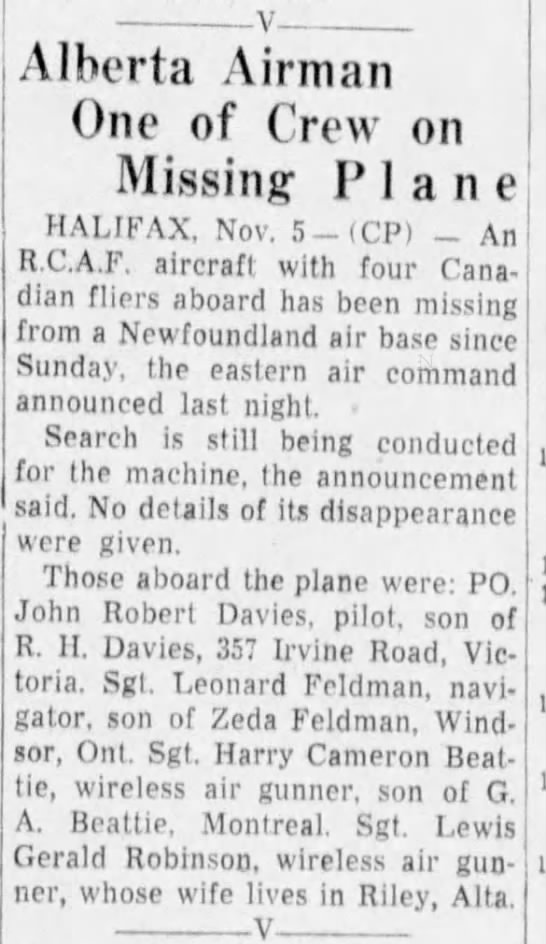
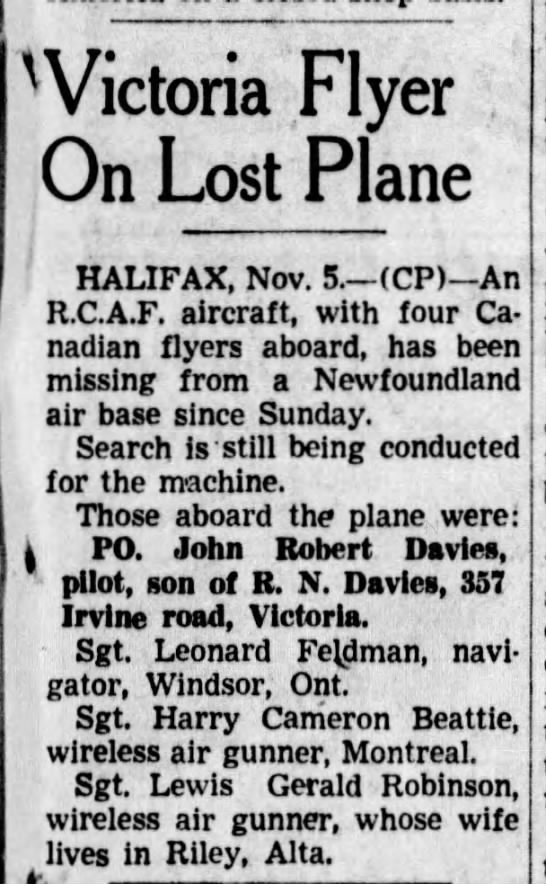

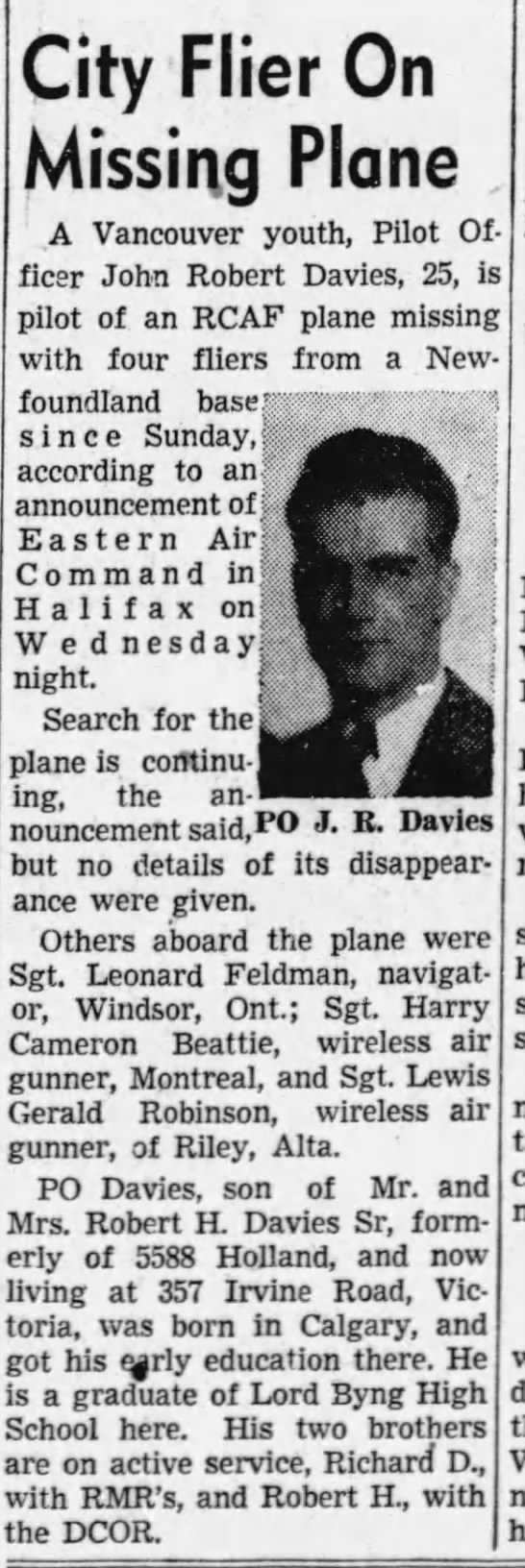
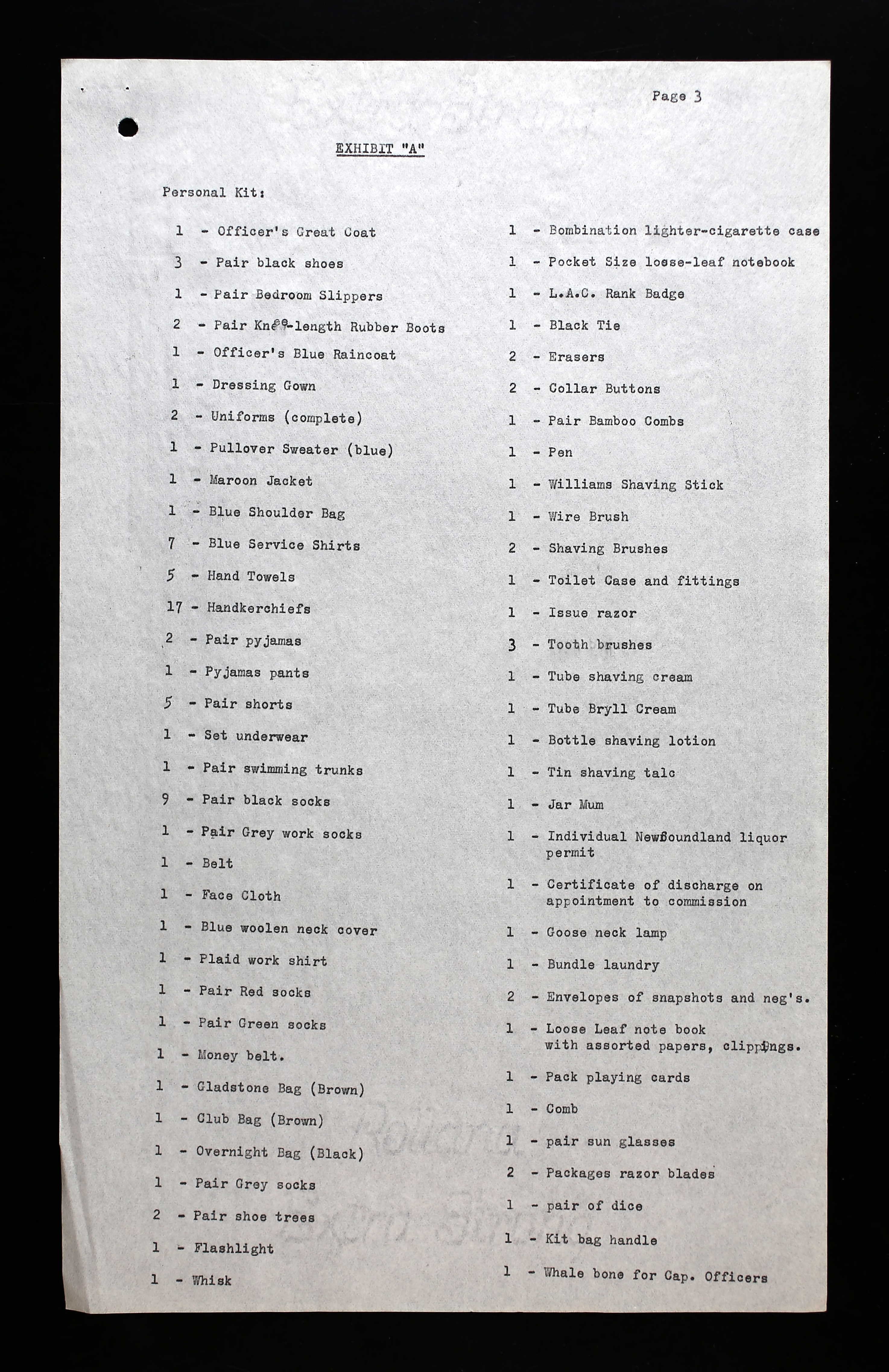
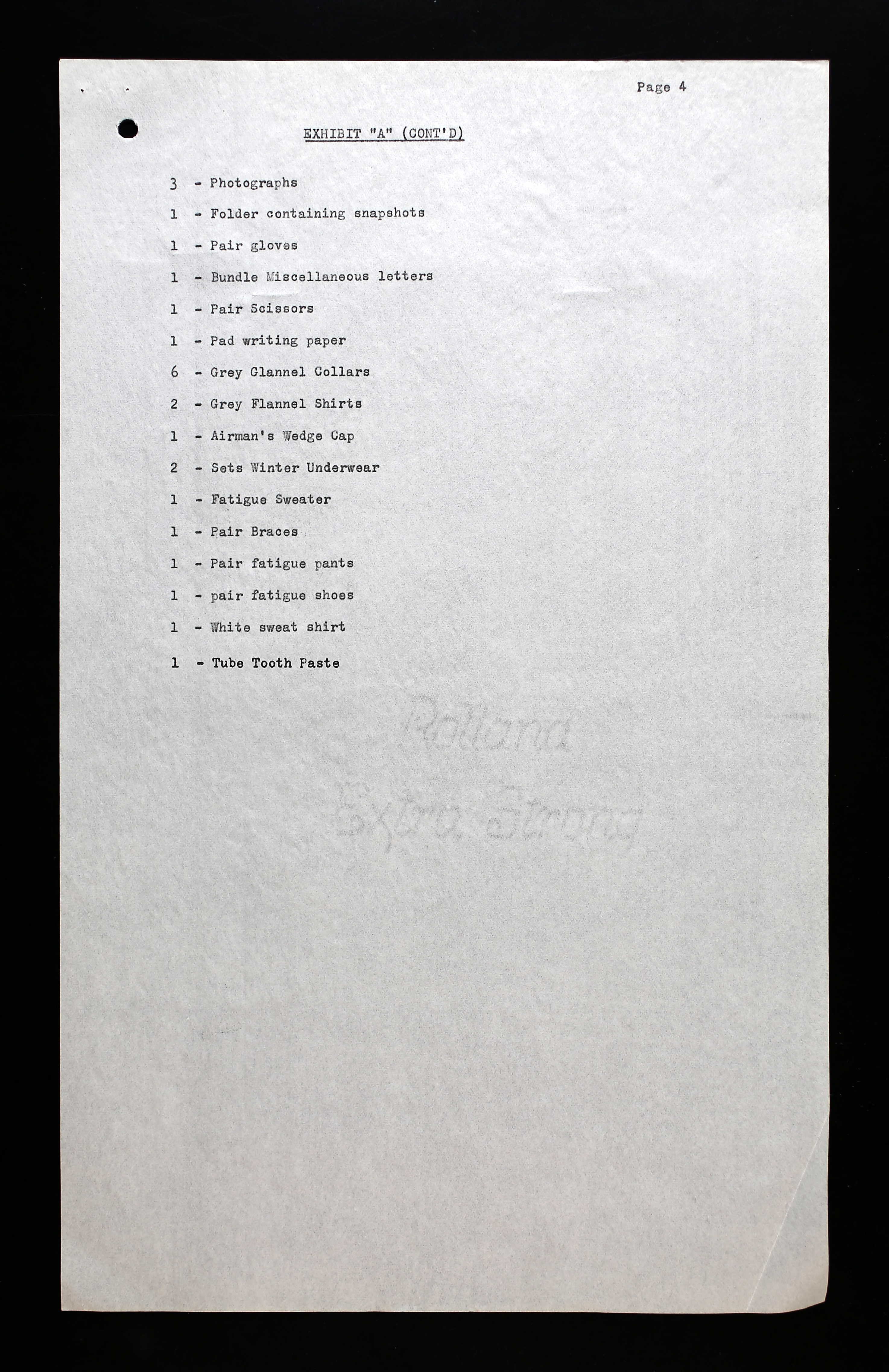
May 4, 1917 - November 1, 1942






John Robert Davies, born in Calgary, Alberta, was the son of Robert Henry Davies (1888-1960), real estate agent, and Rose Catherine (nee Leary) Davies. Mrs. Davies died in December 1925. Mr. Davies remarried;, his second wife was Janet Agnes Wingate. They lived in the Victoria, BC area. He had two brothers, Robert Henry Davies, Jr. (1920-1977) and Richard David Davies (1918-1991). Both brothers served in the Canadian Army overseas. The family was Anglican.
John enjoyed golf, tennis, and swimming, as well as fishing. He was an assistant bookkeeper for three years and a collector for Industrial Acceptance Corp in Edmonton and Vancouver for three years. He also was a salesman with Montreal Life Insurance in 1941.
Previous military experience with the 2nd Bttn, Edmonton Fusiliers, 1940-41 was noted on his Interview Report June 7, 1941 in Vancouver, BC. John stood 5’10” and weighed 154 pounds. “Kee, mature, confident. Should make good aircrew. Recommend for pilot.”
John started his journey through the BCATP at No. 2A Manning Depot, Penhold, Alberta on July 12, 1941. He was sent to Calgary and No. 11 ED from July 15 to August 5, 1941 until he was sent up to Edmonton and No. 4 ITS. There he remained until September 13, 1941. “86%. Visual Link 67%. Inclined to slight nervousness, otherwise, better than average trainee type.” he was 38th out of 134 in his class.
He was then sent to No. 16 EFTS, Edmonton, Alberta from September 14 to November 7, 1941. He was in detention for five days November 1-5, 1941. “Aerobatics and forced landings weak. GROUND TRAINING: 77.7%. Conduct very poor. An unreliable type.” PART III: Average qualities as an operational pilot. Recommended for fighter pilot and GRL. General flying quite good. No serious faults. Fairly steady on instruments. 16th out of 57 in class. Average type student. Inclined to be overly-confident and lacks leadership qualities.” Part III: Average start. Slow progress. Low average. Instruments high average. Link: below average. Ground training: Above average student.”
He was in Claresholm, Alberta at No. 15 SFTS, from November 8, 1941 until March 7 1942. He was in the hospital from February 13 -17, 1942.
John was posted to No. 13 OT Squadron, Patricia Bay, BC, March 8, 1942.
John traveled to Bellingham, Washington in May 1942, Halifax and Yarmouth, June 1942.
On August 13, 1942, he was taken on strength with 145 Squadron, Torbay, Newfoundland. On October 3, 1942, John was qualified as first day pilot, day and night on Hudson aircraft August 8, 1942, and then qualified as first pilot night on Hudson Mk I and Mk III, effective October, 3, 1942.
“This officer does not realize the importance of navigation in a reconnaissance squadron. Inclined to let things slide. Needs strict supervision. This pilot has had 100 Hudson time but was sent on the course for bombing practice and full bomb load check out. Qualifications: 1st Pilot DAY: requires a little smoothing out of his landings before he is ready for a bomb load check. REMARKS: Appears keen and enthusiastic, needs to spend some time as 2nd pilot on patrol before he is ready for operation work. Average.”
John was placed under arrest October 26, 1942 due to an incident in the Airmen's Mess the night before. A Court of Inquiry was struck.
The first witness, LAC Joseph William Ramsey, R145927, cook and butcher in the Airmen’s Mess, night duty, RCAF Station, Torbay stated: “On the morning of October 25th, 1942 at 0300 hours, four officers came into the mess and asked for something to eat. LAC Blake was in charge and I referred them to him. Shortly after, they came back and LAC Blake told me to feed two officers who had been on duty, which I did. I cooked some eggs and made some toast for the two officers concerned. The other officers said they did not want anything to eat at that time. I knew there had been a few words, but I never heard any of them as I had been working in the butcher shop. The officers approached me first because they came in the back door an I was there working. I referred them to LAC Blake. I only knew Pilot Officer Davies. They did not say they had authority to eat by reason of being on flying duties. They did not produce any meal chits. I would not say that they were exactly sober, but I did not have much to do with them. They were speaking to LAC Blake who was in the bake shop and was working several rooms away from me.”
The second witness, LAC George Henry Blake, R118199, cook in the Airmen’s Mess, in charge of the night shift stated: “About 0300 hours on the morning of October 25th 1942 I was working at my regular job in the kitchen and I had occasion to pass the butcher shop in the hallway. I noticed three or more officers in conversation with LAC Ramsay, appearing to be asking for a meal. A few minutes later he referred those officers to myself in the pastry room. P/O Macdonald Approached me, asked me my name, which I gave him, and requested that the members of the aircrew who were with him at the time be given a meal, as they had been on duty. I immediately asked him if they had the necessary chit which I am instructed to demand on such occasions. He replied that he would sign any chit necessary and I informed him that my instructions were to satisfy myself that such officers were actually on flying or operational duties, before serving them a meal. Knowing that at this particular time of the evening, there were no flying operations, I naturally doubted that they had been on duty. At this point, P/O Macdonald became slightly abusive and said, ‘I guess we will have to put this man on charge in order to get a meal,’ or words to that effect, and took out a pencil and a pad and again asked my name and number. I intimated that I would be willing to have him do so in order to have this matter of chits and authorities straightened out. Mr. McDonald then put the pencil and pad back and informed me that he was only in the mess at that time to see that one of the officers received a meal, as he had been informed that there had been considerable trouble in the past in obtaining such meals for men in this unit. This officer, flying officer Robinson, was quite willing to let the matter drop and leave the mess, but Mr. McDonald made himself most unpleasant, and took the attitude that I was to be made to cook this meal. I then offered to cook three eggs, provided these officers gave me their names, and I would report the incident to the Sergeant in charge of the airman's miss on the following morning. In my opinion, all four of these officers were under the influence of liquor. The incident ended with me having to excuse myself from pilot officer McDonald's presence. The three officers who ate the meal preceded to do so, and left forthwith. I recognized three of the officers. They were pilot officer Davies, pilot officer McDonald, and flying officer Maltby. I would say all four had been drinking. Robinson, Davies, Ann Maltby 8 the meals provided. There were no further arguments. The only trouble I had after they ate their meals was to excuse myself from pilot officer McDonald to get back to my work. Pilot officer Davies was not abusive. I had no conversation with him whatever. The last time I received instructions to refuse meals after hours was two nights previous to this incident. The Sergeant in charge of the airmen’s mess impressed on me that the orderly officer had reported to the commanding officer that there were too many meals eaten after hours. The commanding officer gave orders to the orderly office and this practice must cease.” When recalled, he stated: “Depending upon the construction that you would put on the words quite intoxicated, I would say he was in the condition I would describe as mellow.”
Statement of Pilot Officer John Robert Davies: “On the evening in question, I entered the kitchen for the purpose of obtaining a cup of coffee. I was consuming this when Pilot Officer Macdonald handed me a fried egg in the dining room, which I consumed leaving the mess immediately after. Regarding the evidence given previously by leading aircraftman Blake, I was not in the vicinity when the conversation involving pilot officer Macdonald and Leading Aircraftman Blake was going on but had preceded to the dining room to obtain a cup of coffee.”
On November 1, 1942, Hudson BW449 145 Squadron Hudson Mk. III BW449 departed R.C.A.F. Station Torbay at 16:35 hours GMT on an anti-submarine patrol and convoy escort duty. The aircraft failed to return. The pilot was inexperienced and should have had more time as a Second Pilot before becoming First Pilot on patrol duties. It is felt that the pilot let down through the fog and crashed into the sea. All occupants were considered dead after the Accident Investigation Board findings.
CREW: *Sergeant Harry Cameron Beattie, R108299, WAG *Pilot Officer John Robert Davies, J10249, Second Pilot *F/S Leonard Feldman, R109627, Navigator *F/S Lewis Gerald Robinson, R86901, WAG
The Court of Inquiry called thirteen witnesses on November 4, 1942, held at Torbay. The place of the accident that took place on November 1, 1942 was unknown by possibly between Torbay and St. John’s. The pilot was to have carried out a square search. The cause of the accident was “Pilot due to eagerness tried to let down through the fog to investigate a probably ‘blip’ on his RDF and crashed into the sea.” Recommendations: “Inexperienced pilots should have more time as second pilots before becoming first pilot on patrol duties.” The Chief of the Air Staff signed the document with the remarks, “Approved, but finding is pure conjecture. Cause: unknown.”
Mr. Davies, in October 1943, asked, “Is there any reason why I have not received my son’s personal belongings? I would also like to have a statement RE: pay owing and any bonds that he has partly paid for as he told me he was purchasing on the payment plan.”